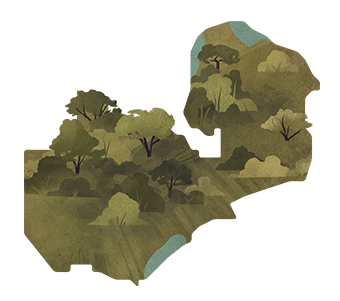Zambia
There is a shortage of healthcare professionals in rural Zambia. SolidarMed is therefore investing in training and building decent housing for health workers in rural areas.

Qualified staff for rural hospitals
In Zambia there is only one qualified doctor for every 10,000 people. And 90% of this small pool of doctors work in large towns and cities. One reason for this is a lack of housing and unappealing working and training conditions in rural areas.
Zambia in Numbers
-
Maternal mortality
213 deaths per 100,000 live births
-
Under-5 mortality rate
61 deaths per 1,000 live births
-
HIV prevalence
10.8 %
-
Doctors/nurses per 10,000 population
1.2 / 18.6 (Switzerland: 44 / 187)
Zambia in Numbers

Zambia

SolidarMed in Zambia
In response to the acute shortage of health workers in Zambia, SolidarMed supports the government’s training programme for healthcare professionals. To this end, SolidarMed is setting up practical training centres and investing in decentralised training for nurses. This improves the quality and quantity of training places in rural areas. Finally, by building staff housing, SolidarMed provides an incentive for qualified staff to work outside of urban centres in rural regions.
Staff shortages in healthcare
Scaling up practical training centres promises to help ease the staff shortages in the health sector. In practical ‘skills labs’, prospective doctors, medical licentiates and nurses can gain hands-on experience alongside their university teaching. The dual training programme promotes rapid learning and ensures that students gain clinical experience early on.

Contact
Patrick Thomas
Programmes Zambia, South Africa, Kenya, India
Tel. +41 41 310 66 60
p.thomas@solidarmed.ch
More training places and better quality through rotation
By rolling out a decentralised training programme for nurses, SolidarMed is making another important contribution to practical training. In 2012, SolidarMed successfully launched an innovative model that allows it to both improve the quality of training and increase the number of graduates. The model involves students at a nursing college rotating between the various affiliated hospitals during their training. Rotation allows students to gain a broader range of experience as the clinical cases can vary significantly depending on the geographical location (e.g. malaria, crocodile bites, road traffic accidents). The model is being scaled up to the whole of Zambia in partnership with the Ministry of Health and the Nursing and Midwifery Council.
Decent housing for health workers
The above successes have encouraged the government to invest more in the training of health workers. But this also requires enough decent housing for staff and students. This is the only way to retain graduates in rural health centres. This is why SolidarMed is building staff housing. This has given rise to an independent social enterprise which is now being gradually handed over to local actors.
Projects in Zambia
SolidarMed educates urgently needed health workers. By providing functional housing, staff have an incentive to work in the rural area.








